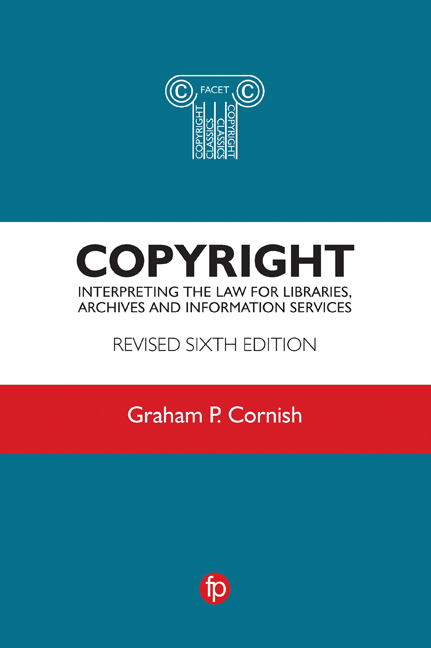Book contents
- Frontmatter
- Contents
- Author's note
- Acknowledgements
- List of abbreviations
- Introduction
- Section 1 Definition and law
- Section 2 What is covered by copyright?
- Section 3 Rights and limitations
- Section 4 Literary, dramatic and musical works
- Section 5 Artistic works
- Section 6 Sound recordings and performers’ rights
- Section 7 Films and videos
- Section 8 Broadcasts
- Section 9 Databases
- Section 10 Licensing schemes and licences
- Section 11 Computer programs, the electronic world and websites
- Section 12 Other matters
- Useful Addresses and Contacts
- Useful Sources of Information
- Appendix: suggested declaration forms
- Index
Section 10 - Licensing schemes and licences
Published online by Cambridge University Press: 19 November 2019
- Frontmatter
- Contents
- Author's note
- Acknowledgements
- List of abbreviations
- Introduction
- Section 1 Definition and law
- Section 2 What is covered by copyright?
- Section 3 Rights and limitations
- Section 4 Literary, dramatic and musical works
- Section 5 Artistic works
- Section 6 Sound recordings and performers’ rights
- Section 7 Films and videos
- Section 8 Broadcasts
- Section 9 Databases
- Section 10 Licensing schemes and licences
- Section 11 Computer programs, the electronic world and websites
- Section 12 Other matters
- Useful Addresses and Contacts
- Useful Sources of Information
- Appendix: suggested declaration forms
- Index
Summary
How do licensing schemes and licences work?
The situation relating to licensing schemes and licences is changing all the time. This section simply outlines the major schemes and licences, how they work, and what benefits and limitations they bring. Details of individual licensing schemes need to be obtained from the relevant agency or organisation. Details of appropriate websites and addresses are given in ‘Useful sources of information’. The outline information in this chapter is current as at summer 2019.
What is the difference between a licensing scheme and a licence?
A licensing scheme covers a defined range of works and is offered to a particular class of organisation (for example, government departments, academic institutions), which anyone who is in the class named can join. A licence is more often an agreement between the copyright owner and an individual user. Their terms may be similar to a licensing scheme but are usually tailored to the specific needs of the user.
Licensing schemes
What is a licensing scheme?
It is a scheme that allows someone who is not the copyright owner to use copyright material beyond the limits of the law with the permission of the copyright owner, which is obtained through a licence issued by an organisation on behalf of the copyright owner.
Who administers such schemes?
They are administered by different organisations, which can change. They are briefly described in the following paragraphs. In addition copyright owners can, and do, issue their own independent licences. These may be ‘one-off’ owners of copyright or large organisations such as the BBC or OS.
Are licensing schemes relevant to libraries?
Certainly, because any licence held by the organisation that owns or administers the library may include copying carried out in the library or by library staff. But it is unusual for licensing schemes to be only for the library. The library is part of a larger organisation, which is licensed as a whole.
Do libraries have to abide by the rules of such licences?
Yes. They represent a contract between the licensing agency and the licensee.
What are the details of such schemes?
Each scheme varies according to the type of material covered and the type of organisation holding the licence.
- Type
- Chapter
- Information
- CopyrightInterpreting the law for libraries, archives and information services, pp. 145 - 156Publisher: FacetPrint publication year: 2019



